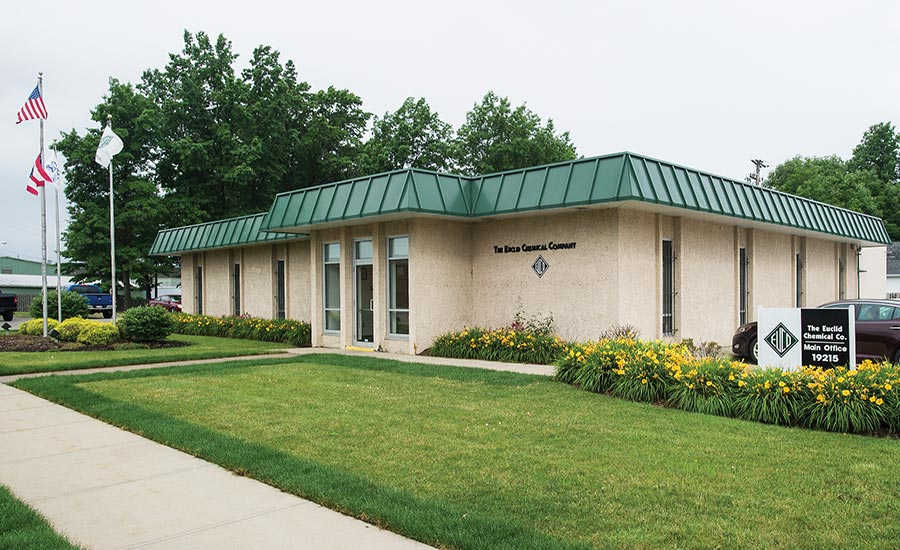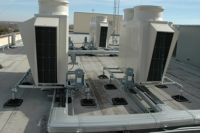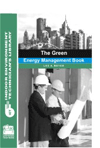Cleveland-based Euclid Chemical has been supplying the construction industry with products to improve the strength, appearance, and usability of concrete since 1910. Now a large multi-national corporation, Euclid Chemical’s main offices are in a two-story, 15,000-sq-ft building that also contains laboratories where it develops products ranging from sealants to micro---synthetic fibers.
Until recently, the building relied upon an aging VAV system with terminal reheat to keep their offices comfortable and to maintain environmental conditions in the laboratories. Even when new, records showed the system had not performed as designed. This inadequate performance was compounded by cumulative effects of years of normal wear and tear plus questionable modifications.
Ultimately, the system no longer kept people comfortable, broke down frequently, and was incredibly inefficient. After analyzing the utility bills, Joe Messer, director of engineering for Euclid Chemical, realized that building had an average annual energy use of 38 KwH/sq ft — over twice the average consumption for offices in that geographic area and even more than most of Euclid’s manufacturing facilities. Messer knew Euclid Chemical needed an upgrade to a dependable and efficient system that would meet their needs for years to come.
The building housed both office areas and laboratories, so throughout the facility the system had to provide individual temperature control which, at any given time, may require both heating and cooling in different areas.
In the lab, the system also had to account for the unique challenge of quickly adapting to rapidly changing make-up air requirements as laboratory fume hoods started and stopped. It also had to work in the Ohio climate where the outdoor temperature ranged from sub-zero weather in the winter to humid high-90s in the summer. But above all else, the system had to have manageable upfront cost and an attractive payback to the financial team.
Messer began the process of finding a new solution and reached out to engineer Andy Culberson of Geisel Heating and Cooling. Culberson identified VRF technology as the optimum solution, and reached out to Peter Eno of Refrigeration Sales Corporation to collaborate on a best-in-class solution based on VRF technology from LG Electronics. Together they designed a system around LG Multi-V Heat Recovery systems.
The bulky 50-ton DX unit on the roof was replaced by a pair of small air-cooled outdoor units on the ground, and the VAV boxes inside the building were replaced with LG’s concealed high-static VRF indoor units. To account for the need for ventilation air and makeup air when the laboratory fume hoods were in use, a small makeup air unit with a water heating coil was added to provide ventilation air at a high-static pressure to the LG VRF indoor units. Since this was 100% outdoor air, the airflow could be adjusted to precisely meet the ventilation requirements as they changed. The LG Multi V is a heat recovery system, so it can heat the zones that need it while cooling others simultaneously which delivers precise temperature in all parts of the facility regardless of Ohio’s weather, including subzero winters.
After they presented the system proposal, everyone at Euclid Chemical was sold on the concept. Based on the problems and poor performance of the existing system, Messer conservatively estimated the new system would cut their utility bills by 40%. What’s more, they could reuse the existing distribution and supply ductwork, reducing upfront installation costs, which further sold the financial team.
Once construction was completed, the system performance exceeded expectations, according to Messer. After implementation, the facility saw a 70% annual energy reduction compared to the average of the previous five years.
Of equal importance, the new system provides a quiet, comfortable environment for people to work.
“Employees have definitely noticed an improvement in comfort,” said Messer. “This allowed us to focus on our core business instead of worrying about HVAC.”
With lab and office space to consider, Euclid Chemical in Cleveland successfully employed a VRF system that met the varying heating and cooling demands in different parts of the building.




